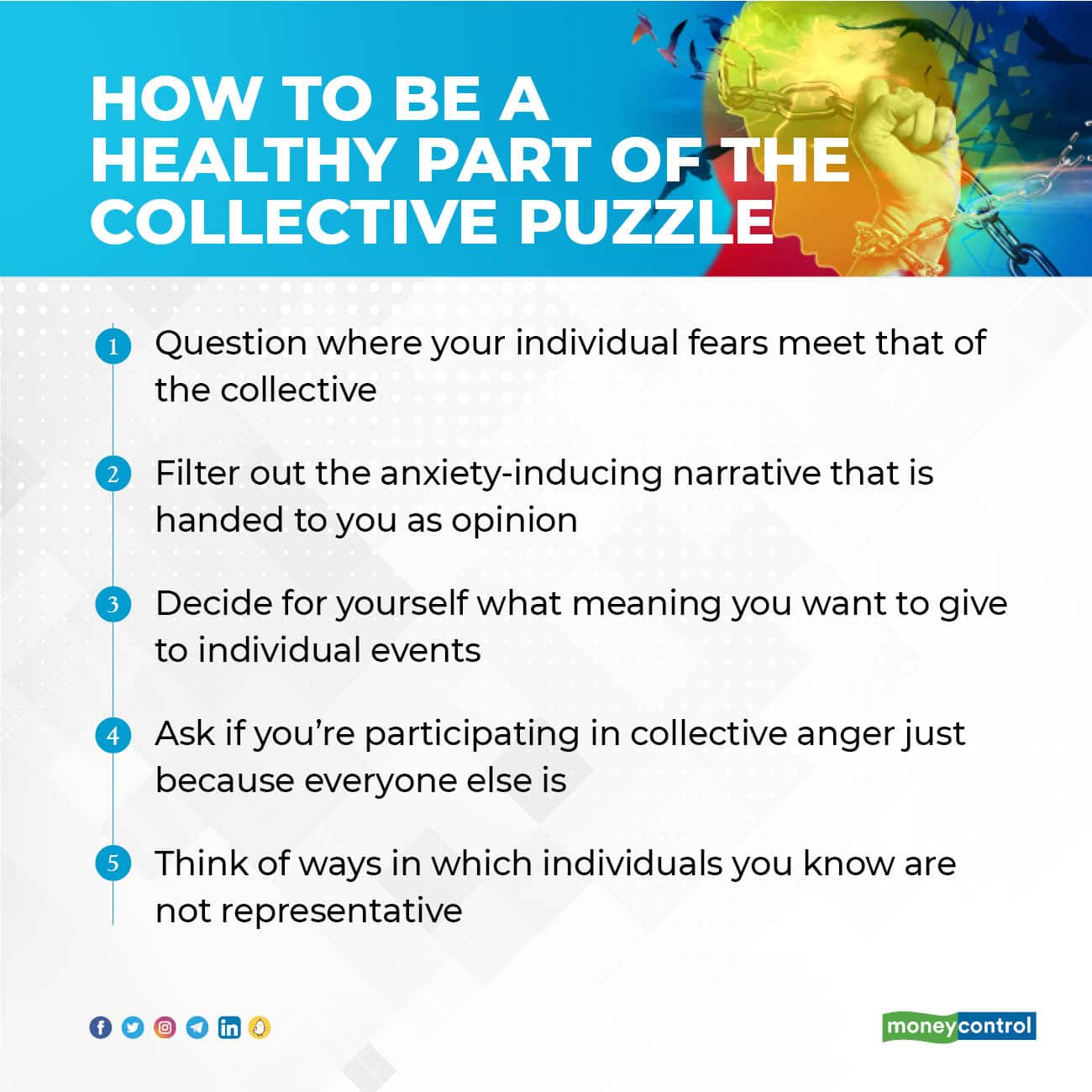



Note to readers: Healing Space is a weekly series that helps you dive into your mental health and take charge of your wellbeing through practical DIY self-care methods.
“Some things cannot be fixed; they can only be carried. Grief like yours, love like yours, can only be carried… I wish this for you: to find the people you belong with, the ones who will see your pain, companion you, hold you close, even as the heavy lifting of grief is yours alone. As hard as they may seem to find at times, your community is out there. Look for them. Collect them. Knit them into a vast flotilla of light that can hold you."
– Megan Devine, It’s Ok That You’re Not Ok: Meeting Grief and Loss in a Culture that Doesn’t Understand.
Do we suffer together or are we each alone? Be it the economy, social, cultural or political turmoil, when we are each in our homes doomscrolling  through social media, news updates and anchors blaring worst case scenarios at us, we often feel isolated by what confronts us. “I” or at best, “my family” is facing such and such a crisis and we feel unsafe, picked on, filled with despair. This isolation persists, individual to individual, home to home, until we end up feeling isolated together. The problem with such a situation is it fails to bind us into the collective, it fails to give us the larger picture, and it fails to point out to us that we are only parts of the puzzle. We heal collectively when we are able to start making sense of the whole.
through social media, news updates and anchors blaring worst case scenarios at us, we often feel isolated by what confronts us. “I” or at best, “my family” is facing such and such a crisis and we feel unsafe, picked on, filled with despair. This isolation persists, individual to individual, home to home, until we end up feeling isolated together. The problem with such a situation is it fails to bind us into the collective, it fails to give us the larger picture, and it fails to point out to us that we are only parts of the puzzle. We heal collectively when we are able to start making sense of the whole.
Flooding in my ground floor flat or on my street may be becoming more frequent and causing me personal damage, but I may not comprehend the scale of climate change until I see the scale of impact on others. Then I understand that its solution also cannot come only from me. This allows me to feel less powerless and to seek community solutions. When I witness reports of communal violence in a different part of the country and it leaves me feeling unsafe in my home, when I understand that it’s happening to ‘us’ as a whole, I recognise the importance of lending my voice to social change movements. Our location of ourselves within a collective allows us to participate also in a collective healing. Be it Partition, Kashmir, communal violence, the aftermath of terrorism, the minoritisation of a group, poverty, hunger and illness, we see that we do not advance alone, and that which holds some of us back holds all of us back.
Collective trauma is faced by a group that may share characteristics, bound by culture, community, or common circumstances, like pandemics, war, or ethnic cleansing, but primarily, according to a 2018 study in Frontiers of Psychology, it emerges from a shared construction of meaning. How we view what has happened to us, the meaning that we attribute to it, dictates the ways in which we identify with our trauma.
Therefore, the screaming news that pushes a ‘commonly held view’ down our throats matters. The more viewers they can get to see an incident or a group of people as intentionally malicious, an attack, the more the trauma sticks. Traumatised people are useful to those traumatising them because they band into a group and groups can be manipulated by pulling up the common agenda. We lose our truly independent thinking, and thus, we play into the agenda of the narcissists. And the political and media machinery is at its core narcissist, even despite a few brilliantly objective individuals, simply by its need for TRPs and click rates. If we were not traumatised by events collectively, we would not be swayable, we would not be hooked in large numbers to ongoing events and we would not provide the eyeballs willingly. Thus, rallying points, protests, disturbance, conspiracy theories and issues that can evoke strong emotions such as fear, resentment, paranoia, become central poles for public discourse. A rape becomes an attack on a community. A roadside demolition distracts from local body corruption and becomes communal. The sense of being attacked is amplified. The common view feeds the fear that it feeds on and creates a cycle. We begin to define ourselves by the trauma.
The good news is that if collective trauma is commonly perceived it can also be commonly dismantled. It is not that terrible events do not happen. It is that when we are careful about how we view them, we reduce the impact of trauma on ourselves. Not all events are communal. Some are politically motivated. Some have local rivalries in play. When we begin to view each issue in isolation, evaluating it on its own merit, and not representative of a group, of ill intention, malice or capability that is defined by culture, religion, caste, ethnicity, we break down the bond of trauma we are held in by external viewpoints. When we are able to work at separating our identity from what happened to us, we are able to put the trauma in perspective and take steps towards healing. We can begin to let go of our own state of fear, chronic stress and anxiety, and also feelings of vengeance, enmity and hatred. We can begin to seek rehabilitation and course correction for all parties involved. This takes concerted effort and a change in the collective discourse, a willingness to alter the shared narrative. For this, all parties, political, social and cultural are vital stakeholders.
We always have a choice to live in a state of anxiety, fear and in the silos these will willingly create for us, or to collectively move towards reparations and a collective state of mind that is dynamic and resilient to shocks. This requires work and will, dialogue, thoughtful public engagement, leaders who are morally bound not to exploit fissures in society, and the openness of mind that we each bring to the table.

Discover the latest Business News, Sensex, and Nifty updates. Obtain Personal Finance insights, tax queries, and expert opinions on Moneycontrol or download the Moneycontrol App to stay updated!